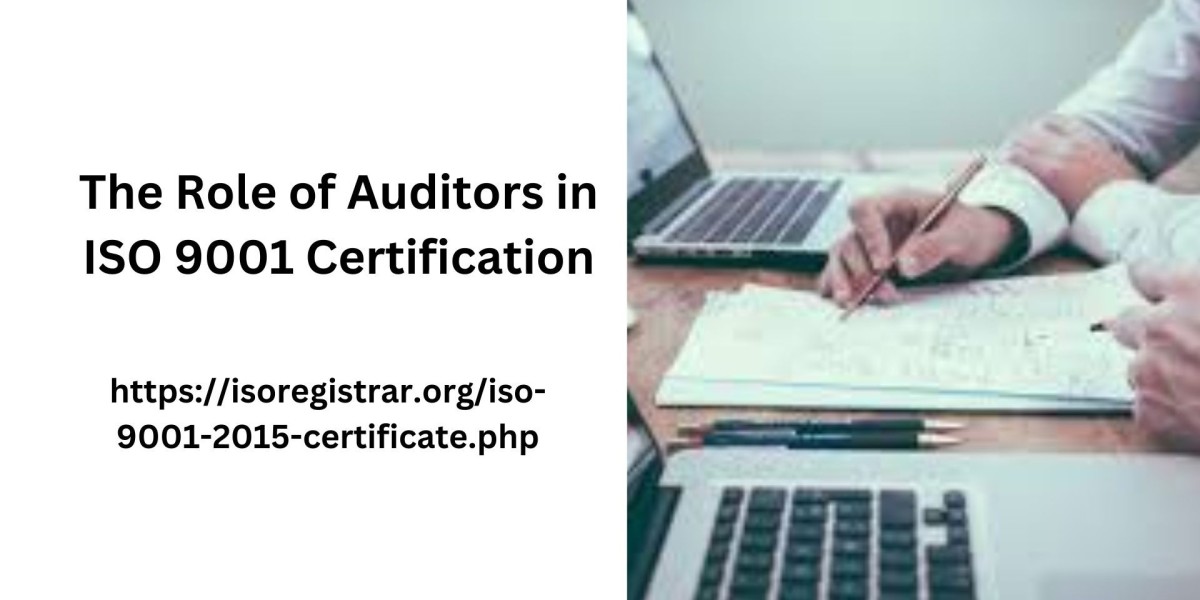ISO 9001 certification is a cornerstone of quality management systems (QMS) for organizations aiming to enhance efficiency, improve customer satisfaction, and comply with international standards. While implementing a QMS is crucial, the role of auditors in the certification process cannot be overstated. Auditors are essential for evaluating compliance, identifying areas for improvement, and ensuring that organizations are truly adhering to the principles of ISO 9001. This article explores the vital role auditors play in the ISO 9001 certification process, their responsibilities, and the impact they have on organizations.
Understanding ISO 9001 Certification
ISO 9001 is an international standard that specifies requirements for a QMS. It is designed to help organizations ensure that they meet customer and regulatory requirements while continually improving their processes. Achieving ISO 9001 certification involves demonstrating that an organization’s QMS complies with the standard's requirements, which can significantly enhance operational efficiency and customer satisfaction.
The Role of Auditors
Verification of Compliance
One of the primary roles of auditors is to verify that the organization complies with ISO 9001 standards. This involves examining the organization’s processes, procedures, and documentation to ensure they align with the requirements set forth by the standard. Auditors will review everything from quality manuals to operational procedures and employee training records.
Assessment of Effectiveness
Auditors evaluate not only whether the processes are in place but also whether they are effective. They assess the organization's ability to meet its quality objectives and deliver consistent products and services. This evaluation helps organizations identify whether their QMS is functioning as intended or if adjustments are necessary.
Identification of Areas for Improvement
Through their assessment, auditors often identify non-conformities and areas where the organization can improve. This feedback is invaluable as it helps organizations recognize weaknesses in their processes, ultimately leading to enhanced efficiency and effectiveness. For instance, an auditor may uncover gaps in training, documentation, or adherence to procedures, prompting the organization to take corrective action.
Providing Recommendations
Based on their findings, auditors provide recommendations for improvement. These insights help organizations prioritize their efforts and allocate resources effectively. Recommendations may range from minor procedural adjustments to major changes in the QMS, depending on the severity of the issues identified.
Ensuring Objectivity and Impartiality
Auditors play a crucial role in maintaining objectivity and impartiality in the certification process. Independent auditors, who are not involved in the day-to-day operations of the organization, provide an unbiased perspective on the QMS. This independence is essential for ensuring that the certification process is credible and transparent, which, in turn, builds trust among stakeholders.
Facilitating Continuous Improvement
The ISO 9001 standard emphasizes a commitment to continuous improvement. Auditors support this principle by encouraging organizations to adopt a proactive approach to quality management. By highlighting areas for improvement and recommending best practices, auditors help organizations establish a culture of continuous enhancement that extends beyond the certification process.
Conducting Management Reviews
Auditors often participate in management reviews, where they present their findings and recommendations to top management. These reviews are critical for strategic decision-making, as they provide insights into the effectiveness of the QMS and the organization's overall performance. By engaging in these discussions, auditors help ensure that quality management remains a top priority for the organization.
Training and Development
In addition to their auditing responsibilities, many auditors play a role in training and developing staff. By sharing their expertise, auditors can help organizations build internal capacity for quality management. This training can range from educating employees about ISO 9001 requirements to providing guidance on best practices for maintaining a robust QMS.
The Impact of Auditors on ISO 9001 Certification
Building Trust with Stakeholders
The involvement of auditors in the ISO 9001 certification process enhances trust among stakeholders, including customers, employees, and regulatory bodies. A thorough and impartial audit demonstrates that the organization is committed to quality management and continuous improvement. This trust can lead to stronger customer relationships and improved market reputation.
Enhancing Organizational Performance
By identifying inefficiencies and areas for improvement, auditors help organizations optimize their operations. This enhancement can lead to increased productivity, reduced waste, and improved product quality. Organizations that actively engage with auditors and act on their recommendations are more likely to achieve long-term success and sustainability.
Facilitating Market Access
ISO 9001 certification can be a prerequisite for entering certain markets or securing contracts, especially in industries where quality is critical. Auditors help ensure that organizations meet the necessary standards, facilitating access to new markets and opportunities for growth.
Promoting a Culture of Quality
The involvement of auditors fosters a culture of quality within organizations. Their independent assessments encourage employees at all levels to take quality seriously, reinforcing the importance of adhering to procedures and striving for continuous improvement.
Note: Apply for iso 14001 certification through the iso portal
Conclusion
Auditors play a crucial role in the ISO 9001 certification process, serving as independent evaluators who verify compliance, assess effectiveness, and identify opportunities for improvement. Their insights and recommendations not only help organizations achieve certification but also contribute to long-term success by promoting a culture of quality and continuous enhancement.
As organizations navigate the complexities of quality management, engaging with competent auditors is essential. Their expertise, objectivity, and commitment to best practices are invaluable assets that help organizations not only meet ISO 9001 requirements but also excel in their quality management efforts, ultimately leading to improved customer satisfaction and operational efficiency. Embracing the role of auditors in the ISO 9001 certification process can be the key to unlocking an organization’s full potential in today’s competitive marketplace.









